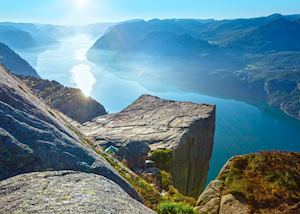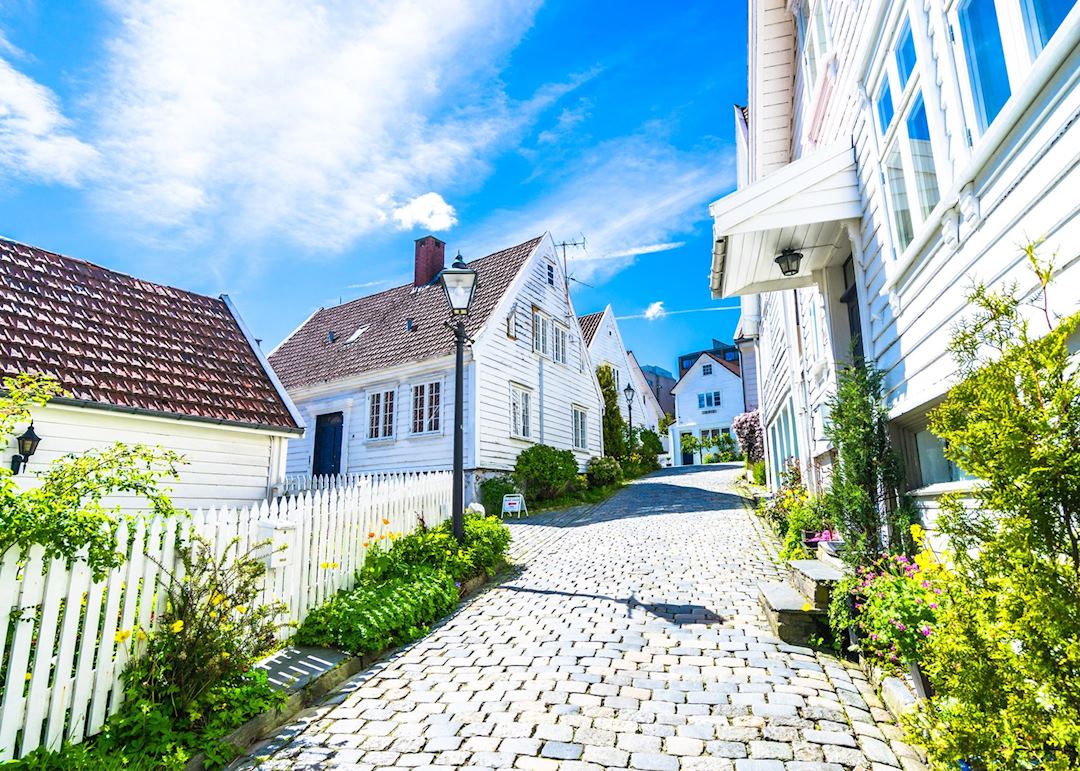Once a thriving fishing port and today a booming city, Stavanger is a great base for exploring the fjords and hiking through some of Norway’s most ruggedly attractive landscapes. We can introduce you to guides who will help you uncover the best hiking routes, including a hidden back way to the well-known Pulpit Rock. We can also arrange a cruise through the narrow, dark waters of Lysefjord — the southernmost of Norway’s large fjords.
However, don't let the myriad activities in the countryside overshadow the city itself. You might stroll through the cobbled streets of Gamle Stavanger to admire the 18th-century houses, explore the newly refurbished Gothic cathedral, or visit the city’s distinct museums, including one devoted entirely to the art and science of canning fish. Or you can relax as you wander along the waterfront of the attractive port.
Things to see and do in Stavanger
Hiking in Stavanger — Pulpit Rock & Kjerag
 One of the most popular hiking destinations in the world, Pulpit Rock is known as Preikestolen in Norwegian. It’s a moderately challenging hike with some steep sections, but at the top, your efforts are rewarded with sweeping views of the surrounding mountains and the dark waters of the fjord.
One of the most popular hiking destinations in the world, Pulpit Rock is known as Preikestolen in Norwegian. It’s a moderately challenging hike with some steep sections, but at the top, your efforts are rewarded with sweeping views of the surrounding mountains and the dark waters of the fjord.
On a clear day in the summer, experienced hikers can climb the route without guidance — lots of people do. However, to avoid the throngs, we can arrange a local guide who’ll show you a little-known back route. We can also arrange a wide array of other hikes in the region, like a guided hike up Kjerag to the huge boulder ominously wedged between the cliffs.
Cruising Lysefjord
For a more leisurely way to explore, you can opt to cruise along Lysefjord, a narrow finger of water cradled between steep mountains. Listening to the narration of your captain, you’ll see Pulpit Rock from a different perspective, as well as the dark depths of some of the fjord’s landmarks, like Vagabond’s Cave (Fantahålå), named after the band that took shelter there. If you’re lucky, you might glimpse the sure-footed goats that make their home on these near-vertical slopes.
You’ll also learn about the forces that shaped the landscape you’re sailing along and over — the fjord is as deep as the mountains are tall, carved out by ancient glaciers more than 2.5 million years ago.
Gamle Stavanger & Øvre Holmegate
Today, Stavanger is one of Norway’s biggest cities thanks to deep-sea petroleum drilling. However, oil isn’t the only boom that’s bolstered the city’s fortunes. During the 1800s, herring were unusually populous in the icy, rich waters off the coast and Stavanger’s fishing and canning industries flourished.
Gamle Stavanger — the old town — dates to that era and makes a pleasant place to stroll for an afternoon, especially in the summer. This small clutch of cobblestone streets is lined with tidy clapboard houses, all painted white and meticulously maintained by their owners. The small terraces and window boxes burst with blooms.
For a more in-depth look at the region and several other of the city’s main sights, we can arrange a guided walking tour. You’ll also explore Øvre Holmegate, an area of houses and shops across the water painted in an eye-catching rainbow of shades.
Best time to visit Stavanger
Though you can visit Stavanger year-round, the best time for hiking to Pulpit Rock is April, May, and October. The weather is comfortable and cool, and you’ll encounter few other hikers. You’ll find warmer weather and longer days from June to August, ideal for hiking less-popular trails and for cruising, as well as exploring the city.
who's been there
-
617-223-4521617-223-4116
- Make an inquiry
Places near Stavanger
- The Norwegian fjords 69 miles away
- Bergen 100 miles away
- Oslo 189 miles away
- Ålesund 243 miles away


